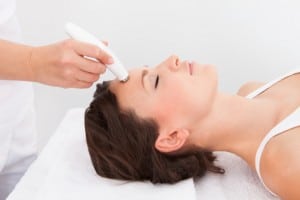 Whether to remove age spots, smooth out wrinkles, get rid of unwanted hair, or to reduce the appearance of facial and leg veins, laser therapy has long been used to treat a wide range of dermatological and cosmetic issues. At the Dermatology Center of Indiana we use a wide range of laser treatments to address a long list of aesthetic and cosmetic health concerns. You may be wondering, however, if laser therapy is actually safe to use and whether it is truly an effective solution for dealing with unwanted skin and cosmetic health issues. Thankfully, laser treatment today is extremely safe and highly effective for many people. Let’s take a closer look, however, at both the safety and effectiveness of laser treatment below.
Whether to remove age spots, smooth out wrinkles, get rid of unwanted hair, or to reduce the appearance of facial and leg veins, laser therapy has long been used to treat a wide range of dermatological and cosmetic issues. At the Dermatology Center of Indiana we use a wide range of laser treatments to address a long list of aesthetic and cosmetic health concerns. You may be wondering, however, if laser therapy is actually safe to use and whether it is truly an effective solution for dealing with unwanted skin and cosmetic health issues. Thankfully, laser treatment today is extremely safe and highly effective for many people. Let’s take a closer look, however, at both the safety and effectiveness of laser treatment below.
How safe is it?
Laser treatment is extremely safe. Technological and medical advances in recent years have significantly lowered the chances of serious side effects. In the vast majority of cases, the only side effects our patients experience, if any, are mild swelling or soreness around the skin area that has been treated using laser treatment. Typically, such swelling or soreness only lasts for a few hours. Bruising may also appear, but this also tends to go away after less than a week. The chance of side effects forming can also be reduced by following the advice of your practitioner.
During the treatment itself you may also feel a slight heating or tingling sensation, but most of our patients report that this sensation is not painful. In some cases, the sensation might be closer to a slight stinging or burning, but it is very rare for patients to require anesthetics during laser treatment. Furthermore, with our pulse dye laser treatment your skin is further protected by DCD, which is a cooling method that protects the targeted skin’s epidermis.
Does laser treatment work?
Laser treatment may look like it comes straight out of a science fiction movie, but the truth is that it is highly effective at treating a wide range of conditions. Laser treatment uses an intense beam of light that targets specific cells. While laser treatment can be used to treat unwanted hair, skin blemishes, wrinkles, facial and leg veins, acne, and even tattoos in most people, its actual effectiveness and permanence sometimes depend on the specific individual being treated. Laser hair removal, for example, tends to work best on individuals who have lighter skin and darker hair, although we do also offer effective laser hair removal treatment for patients with darker skin types. Furthermore, the effectiveness of laser treatment can be drastically affected by steps you take in the weeks, months, and years after leaving our clinic. Protecting yourself against sun exposure, for example, will not only help protect your skin, but can also improve the efficacy of laser treatments, especially of those used to target age spots and sun damage. Always follow the advice of your practitioner both before and after treatment in order to get the best results.
Laser treatment today is not only effective, but it is also extremely safe, especially when compared to alternative treatments like surgery and prescription medications. Our trained medical staff at the Dermatology Center of Indiana have the experience and qualifications necessary to make laser treatment the perfect treatment option for your own aesthetic and cosmetic needs.
Disclaim: This blog provides general information and discussion about medical, cosmetic, mohs, and surgical dermatology. The words and other content provided in this blog, and in any linked materials, are not intended and should not be construed as medical advice. If the reader or any other person has a medical concern, he or she should consult with an appropriately-licensed dermatologist or other health care worker.